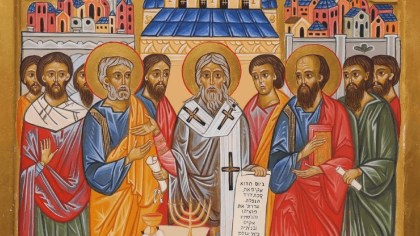- Bible Reading: Acts 15:1-18
- Free Resource: God Wants Me To… (PK-2nd – NL)
- Unit Theme (April 4—May 23): Birth of the Church
- The Point: God’s will is revealed in Scripture and conversation with each other.
The Acts of the Holy Spirit Continued
In the Narrative Lectionary this year, we are now in our third reading from Acts. This time, we are seeing the Holy Spirit’s work when the believers are in passionate disagreement over a core theological matter: What about the Gentiles?
Gentiles
Before Jesus, there was a significant divide between Jews and Gentiles. In fact, the Greek word we translate “Gentiles” is ethnos (as in ethnic) meaning “peoples or nations.” It’s a blanket term for anyone who isn’t Jewish. God’s covenant was with the people of Israel and kept them separate from the nations. The sign of that covenant was circumcision and the responsibilities were to keep the Torah (law of Moses). So, for a Gentile to become Jewish, they had to be circumcised and follow the law of Moses.
Now we come to the time after Jesus’ death, resurrection, and ascension and after the Holy Spirit was given to spread the good news to the ends of the earth. So, what now? How does a Gentile become a follower of Jesus, a member of the family of God? Is it any surprise that a group of believers who are devoted to the Torah would expect the ways of Scripture and tradition to continue? Gentiles who wanted to become part of this Jewish sect following the Jewish Messiah would need to first become Jewish. It’s important to understand and empathize with this group, and it’s way too easy to just dismiss them as “wrong,” in part because they are Pharisees (i.e., the group famous for opposing Jesus).
Barriers
These Pharisee believers were concerned about following Scripture and the established traditions. Don’t we also try to follow Scripture and our theological traditions? They wanted things to be done correctly. However, those they disagreed with saw it as an issue—not of Scripture or tradition—but of diversity and inclusivity. They were concerned with how many barriers were in the way of Gentiles who were excited to follow Jesus. Note that the “inclusive” group was not saying that circumcision and following the law of Moses were bad. But these were barriers that made it harder for Gentiles (outsiders) to be accepted. In this case, Scripture and tradition were being used to exclude people, or—at the very least—to force “them” to become more like “us” to belong.
Experience
As the apostles and elders were discerning what to do about this, they didn’t seem to search the Scriptures. Instead, they listened to people’s experiences. They wanted to know what the Holy Spirit was up to at that time. It just so happened that Peter, Paul, and Barnabas had some dramatic experiences with the Spirit’s movement among the Gentiles. The Spirit didn’t seem to care whether a person was a Jew or a Gentile. The Spirit worked in and through both.
It is important to see that when the apostles were listening to experience, they were not looking to see how one or a few people “felt” about the issue. They were looking for witnesses of the Spirit, using evidence-based decision-making. And then they connected that experience with the core doctrine:
“We believe that we [Jewish believers] will be saved through the grace of the Lord Jesus, just as they [Gentile believers] will.”
Acts 15:11
Inclusive Gospel, Inclusive Church
The first ecumenical Council at Jerusalem decided this issue on the side of inclusivity. The Spirit was being inclusive, and the core gospel message is one of ultimate inclusion: there is no characteristic or history or action that we need to (or can) change to be loved and included by God. The work was done in the death and resurrection of Jesus and the gift of the Holy Spirit.
The gospel message is radically inclusive. That means the church must be radically inclusive, too.
Free Activity
Each week I offer a free activity for congregations to use for faith formation. This week’s activity “God Wants Me To…” helps disciples young and old reflect on how we can learn about God’s will for us. This activity was written for our Living the Word: Kids (PK-2nd, NL) product, though it can be used in pretty much any context.
Blessings,
Gregory Rawn (Publisher)
2021-2022 Faith Formation Resources
Our Narrative Lectionary and Revised Common Lectionary products for the upcoming 2021-2022 program year are now available for download. Find out more!
- Home Faith Formation for the Narrative Lectionary and the Revised Common Lectionary
- Resources for the Narrative Lectionary (products for all ages)
- Resources for the Revised Common Lectionary (home-based and intergenerational classroom)
- Cross+Generational Confirmation with an optional online community
- Worship and Liturgy Education
- Information page: Our Products and COVID-19.
Stay updated by liking our Facebook page, subscribe to our e-newsletter, or follow this blog!

Leave a Reply